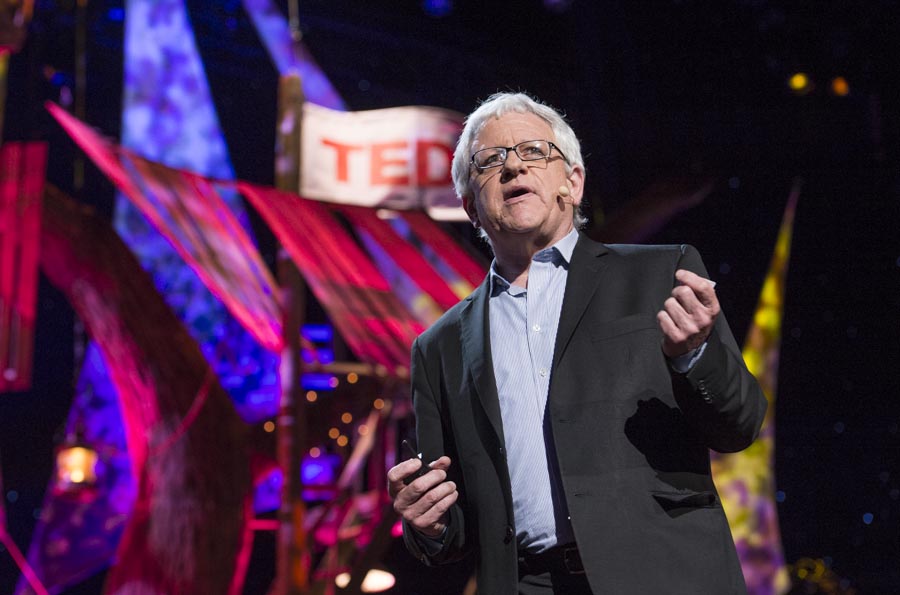Stuart Firestein begins with an ancient proverb, “It’s very difficult to find a black cat in a dark room, especially when there is no cat.”
Firestein, the chair of Biological Sciences at Columbia University, thinks that this is a good metaphor for science. Generally we think science is orderly, a collection of knowledge. But real science doesn’t look like that. The fact is very few scientists use the formal scientific method. Really, says Firestein, “It’s farting around… in the dark.”
This difference became clear to him because of his dual role as professor and investigator. In the lab, he and his students would stumble around and come up with interesting questions, and it was exhilarating At the same time was teaching comprehensive lecture course. He uses a famous textbook, which weighs 7.5 pounds, twice the weight of a normal adult human brain. By the end of the course the students had the idea that we know everything about the brain. They also had the idea that what scientists do is gather facts and put them into books. But that’s not it at all. When scientists gather in the bar after conferences, they don’t talk about what they know, they talk about what they don’t know — all the open questions and problems they face.
So, according to Firestein, what’s exhilarating is this: Ignorance.
Teaching ignorance
So he started teaching a course on ignorance (“Something I can finally excel at.”). Of course, ignorance has many bad connotations, and he doesn’t mean those. He means the kind of ignorance stated by J.C. Maxwell, “Thoroughly conscious ignorance is the prelude to every real advance in science.” The course materials are all free on his site, and he welcomes people using them.
The point of the class is to give a real image of what science is, what scientists think about every day. Here are some some mistaken ideas about how science works:
- Putting puzzles together. That suggests there’s an ending. But there is no ending.
- Peeling away layers of an onion to get to kernel of truth. But there is no kernel.
- It’s like seeing the tip of an iceberg. Bug again, that implies there is a whole iceberg to be seen.
The model Firestein likes is ripples on a pond: as the knowledge grows, so does the ignorance. It’s not that ignorance is transformed into knowledge. The more important process goes in the other direction. Knowledge leads us to higher-quality ignorance, always trying to settle on better and better questions. “The purpose of knowing a lot of stuff,” he says, “isn’t to know a lot of stuff, it’s to be able to frame thoughtful, interesting questions.”
It’s very much worth noting that this conversation has been going on for some time. He quotes Erwin Schrodinger, “In an honest search for knowledge, you quite often have to abide by ignorance for an indefinite period.”
Destroying creativity with knowledge
In the end, it comes down to the education system. In this era, when we have Google and Wikipedia, universities and schools need a different model. It can’t be about teaching facts, it has to be about generating a thirst for knowledge.
But that’s not what seems to happen. In second grade, almost every child is curious, exploring the world. By tenth grade, he says, almost none of them are excited by science or think of it as a possible career. It has to do with what his friend calls the “bulemic model of education.” We push facts down their throats, and then expect them to repeat them back.
Firestein imagines an education system where you could pose this multiple-choice question:
What is X?
- I don’t know (no one does).
- What is the question?
- Look it up, or ask someone.
Or even a question from an advanced class: “Here’s the answer, what’s the next question?”
He finishes with a quote from W.B. Yeats: “Education is not filling buckets; it is lighting fires.” And, adds Firestein, “Let’s get out the matches.”
Stuart Firestein’s talk is now available for viewing. Watch it on TED.com »

Comments (13)
Pingback: IGNORANCE | Qualitative Methods
Pingback: A plea for 'Close learning' - world.edu
Pingback: A Plea for ‘Close Learning’ |
Pingback: A Plea for ‘Close Learning’ | America's Children
Pingback: “Close Learning” and The Value of Ignorance | Composition @ KU: Resources for Teachers
Pingback: A Plea for ‘Close Learning’ | Distant Learning Blog
Pingback: A Plea for ‘Close Learning’ | Home Learning Tips
Pingback: A Plea for ‘Close Learning’ | Education QA
Pingback: Three TED speakers have been named Guggenheim Fellows | Krantenkoppen Tech
Pingback: Three TED speakers have been named Guggenheim Fellows | H Tanalepy
Pingback: TED Talk Gathering
Pingback: Wizmo Blog » Blog Archive » Celebrating ignorance: Stuart Firestein at TED2013